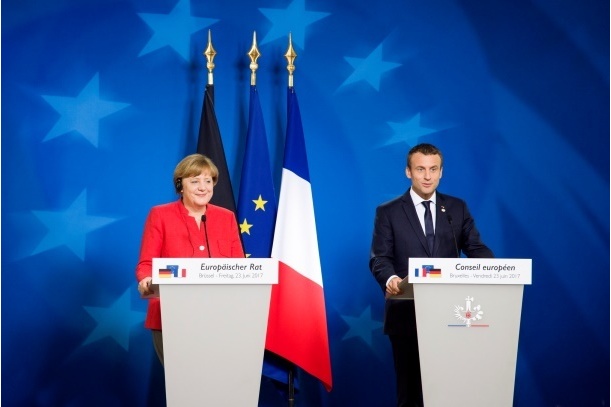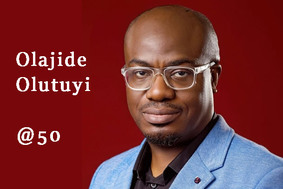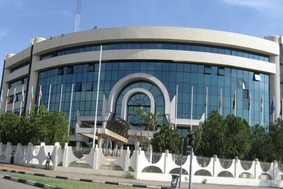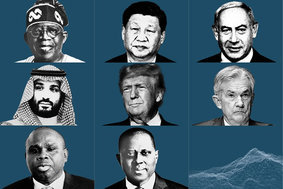Europe's fate foretold

Feature Highlight
Rather than playing second fiddle to Germany, France has shouldered the mantle of co-managing the European Union.
Any close observer of global events can tell you that, in some ways, geopolitics is uncannily similar to geology. Just as the rapid shifts in the Earth's tectonic plates give way to earthquakes that can shake countries and regions to their core, so do the underlying forces of international affairs send deep tremors across corners of the globe from time to time.
Perhaps no region knows this better than Europe, which has taken up the difficult task of determining what its future will look like. Many citizens within the European Union are unhappy with Brussels' leadership, while many more are dissatisfied with the political agendas of individual member states. As the Continent's leaders try to forge a path forward, this discontent will doubtless be on their minds as they grapple with the thorny issues of austerity, defence and illegal immigration that must be settled carefully if the bloc is to survive.
The Point of No Return
From its position at Europe's helm, Germany has pushed its plan for austerity by persuading fellow EU states that it is the only solution to the Continent's continuing economic troubles. Berlin feared that if one struggling country received a bailout with no strings attached, others would soon follow demanding the same. But former French President Francois Hollande, answering the rising tide of Euroscepticism within and beyond his country, staunchly opposed Berlin's approach of tying financial aid to stringent domestic reforms.
The clash of Europe's two titans became painfully clear in their conflicting responses to a mountain of Greek debt. Aware that it couldn't continue to lead the European Union if Greece remained a eurozone member, Germany offered the foundering country a way out of the monetary union in July 2015. But France, along with the United States, pushed back against the idea. Jack Lew, the U.S. treasury secretary at the time, even bluntly stated that a "Grexit" would be "geopolitically a mistake." He urged European officials to keep the rescue of Greece on track. And as Athens' financial problems grew, EU members lined up on both sides of the debate, revealing the deep ideological rift within the bloc.
Now the European Union has reached the point of no return: Will it continue to acquiesce to Germany's desire for austerity, regardless of other members' reluctance to do so? Or will it balance the strict rules of the eurozone with the public's calls for a welfare Continent?
A United Effort for a 'New Europe'
Recent speeches by European Commission President Jean-Claude Juncker and French President Emmanuel Macron may have shed some light on the answer to this question. In a recent talk about his view of the Continent's future, Juncker outlined five possible scenarios: maintaining the status quo, preserving only the single market, allowing a multispeed Europe, doing less more efficiently or doing more together as a cohesive whole. Based on Macron's call for a "new Europe" on Sept. 7 in Athens, it seems likely that Europe will choose the last of these paths.
Macron's choice of Greece as the location to reveal his vision for the Continent was hardly random. For one, the French president has a history of currying favour with Greek Prime Minister Alexis Tsipras: During his tenure as Hollande's financial adviser, Macron strongly supported the provision of debt relief to Athens while deeply opposing Germany's calls for austerity. For another, Pnyx (the location in Athens of Macron's speech) is often considered the birthplace of democracy, where the Athenians of ancient Greece once hosted their popular assemblies. Fittingly, Macron lobbied for greater democracy, cooperation and solidarity in the European Union as he stood on the same spot thousands of years later. He then warned that the Continental bloc's "sovereignty, democracy and trust are in danger."
The French president also used the venue to demonstrate his country's readiness to play its part in rebuilding Europe — in part, by helping Greece to secure debt relief — in the years to come. Rather than playing second fiddle to Germany, France has shouldered the mantle of co-managing the European Union. By unveiling his proposals to a Greek audience, Macron demonstrated Greece's importance to France as a strong ally in Southern Europe as Paris assumes the burden of leadership, particularly at a time when the Continent has begun to break into alliances based on regional divides.
Germany, for its part, seems to have acknowledged the fact that it can no longer lead Europe alone. After the country's recent elections left the ruling party with the unenviable task of cobbling together a coalition from a political spectrum that is more divided than ever, German Chancellor Angela Merkel admitted that Macron's "new Europe" could be the first step toward building a federal system of governance within the Continental bloc.
Though the agendas of Germany and France conflict in many ways, the two countries are willing to set aside their differences to rebuild a stronger Europe. To that end, they have found common ground in their pursuit of the creation of the post of EU finance minister, and a post for EU foreign affairs minister probably won't be far behind. Of course, the establishment of these offices will take quite a bit of time, effort and negotiation. But in the end, a German and Frenchman (if not necessarily in that order) will doubtless fill them.
Federalism: Keeping a Continent Together
Nevertheless, the regional alliances that coalesce around France and Germany in response to economic issues will only solidify in the face of energy and security problems in the coming years. Because of its dependence on Russian natural gas, the European Union will prioritize the discovery and exploitation of alternative energy resources. The Mediterranean Sea presents an opportunity for such diversification – and for closer cooperation among Southern European states.
Consider Cyprus, whose exclusive economic zone (EEZ) and energy reserves have positioned it to become a major natural gas exporter to Europe. French energy giant Total has already begun to explore Block 11 of the EEZ with the expectation of finding a field akin in size to Egypt's massive Zohr field. Meanwhile a consortium operating in the EEZ that comprises France's Total, the United States' ExxonMobil, Italy's Eni and Qatar Petroleum will unite several Southern European states (France, Italy, Cyprus and Greece) as well as the United States in their desire to secure the unstable region.
In fact, since drilling for energy resources near Cyprus began in July, the U.S. and French navies have bolstered their patrols near the island. Joint military exercises among Eastern Mediterranean nations have also ramped up this year. For instance, Cypriot, Greek, French, British, Italian, Hungarian and U.S. forces participated in the massive "Exercise Argonaut" maritime drill, while Greek, U.S., Israeli and Emirati forces joined in "Iniohos 2017." Finally, Greece and Egypt concluded the "Medusa 2017" joint air and naval exercises in early August. That Germany and its Northern European allies were absent in all of these drills, which were so intensive among France and its Southern European peers, is telling of the federalist fate Europe is heading toward. The Continent's north-south divide will eventually lead to a parallel split in the European Union's agenda, with France taking the lead on matters of defence and Germany heading up matters of the economy, giving rise to a system of federalism that balances the competing interests of the two.
A federalist Europe, however, would require an army that could be deployed at a moment's notice without the bureaucratic red tape that the Continental bloc currently faces. The ambitious "Schengen military zone" that U.S. Lt. Gen. Ben Hodges has proposed thus might not be as far-fetched as it may seem, particularly given Germany and France's willingness to undertake considerable reforms to keep Europe together. Of course, the creation of an EU army would require the approval of member states' parliaments. And though Germany, France and Italy called for the construction of an EU military headquarters at an informal defence ministers' meeting on Sept. 27 in Bratislava, Slovakia, they stipulated that the base would command overseas missions rather than hosting a permanent standing force. Even so, Hungary, the Czech Republic, Luxembourg, the Netherlands, Poland and Sweden have broadly endorsed the proposals of the Continent's two biggest powers.
As the end of the year draws near, the tsunamis spawned by recent geopolitical earthquakes are on the verge of washing over Europe's shores. But the European Union has every motive to save itself by adopting new reforms and systems of governance that abandon the social inequality that decades of austerity measures have exacerbated. Perhaps in doing so the bloc will improve its image among Europe's citizens, regaining their trust by giving the Continent back to those who call it home.
Christos Argyriou is on the Board of Contributors of Stratfor. “Europe's Fate Foretold” is republished under content confederation between Financial Nigeria and Stratfor.
Other Features
-
The best sites to buy and sell Bitcoin in Nigeria: A comprehensive ...
Buying and selling BTC doesn’t have to be a hassle. Check out to best sites to buy and sell Bitcoin in Nigeria ...
-
At 50, Olajide Olutuyi vows to intensify focus on social impact
Like Canadian Frank Stronach utilised his Canadian nationality to leverage opportunities in his home country of ...
-
Reflection on ECOWAS Parliament, expectations for the 6th Legislature
The 6th ECOWAS Legislature must sustain the initiated dialogue and sensitisation effort for the Direct Universal ...
-
The $3bn private credit opportunity in Africa
In 2021/2022, domestic credit to the private sector as a percentage of GDP stood at less than 36% in sub-Saharan ...
-
Tinubunomics: Is the tail wagging the dog?
Why long-term vision should drive policy actions in the short term to achieve a sustainable Nigerian economic ...
-
Living in fear and want
Nigerians are being battered by security and economic headwinds. What can be done about it?
-
Analysis of the key provisions of the NERC Multi-Year Tariff Order ...
With the MYTO 2024, we can infer that the Nigerian Electricity Supply Industry is at a turning point with the ...
-
Volcanic explosion of an uncommon agenda for development
Olisa Agbakoba advises the 10th National Assembly on how it can deliver on a transformative legislative agenda for ...
-
Nigeria and the world in 2024
Will it get better or worse for the world that has settled for crises?
Most Popular News
- NDFF 2024 Conference to boost Nigeria’s blue and green economies
- IFC, partners back Indorama in Nigeria with $1.25 billion for fertiliser export
- CBN settles backlog of foreign exchange obligations
- Univercells signs MoU with FG on biopharmaceutical development in Nigeria
- CBN increases capital requirements of banks, gives 24 months for compliance
- How Africa regulates bitcoin and other cryptocurrencies












